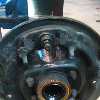hippyheart
Active Member
- Joined
- February 12, 2005
- Messages
- 59
- Reaction score
- 0
- City, State
- West Plains, MO
- Year, Model & Trim Level
- '96 Explorer Sport
Hey all! Well, I have bled my brake lines several times now and I do have clear brake fluid running out of all but, I still hardly have any brakes except when I press the brake pedal all the way to the floor. Still very spongy. What am I doing wrong? I don't see any air bubbles coming out from the fluid. I have an ABS system. Could the air be trapped in that? I have tried many ways of fixing this problem from different websites to no avail. Please give me your thoughts on this! Thanks! Mike 










